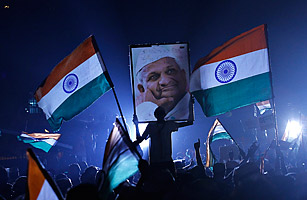
A supporter of veteran Indian social activist Anna Hazare holds his portrait on the ninth day of Hazare's fast at the Ramlila grounds in New Delhi on Aug. 24, 2011
In a year with more than its share of protests worldwide, perhaps the most striking act of dissent took place in India, where the country's ruling coalition took flak for a host of corruption cases implicating a number of leading politicians. Anna Hazare, a 74-year-old activist with a Gandhian air, commanded something of the Mahatma's aura when he embarked on a series of hunger strikes in protest of the graft that his supporters say pervades all strata of Indian society. Hazare's fasts — even the threat of them — triggered mass demonstrations of support across India's major cities and heaped pressure on the government to create an independent ombudsman body capable of investigating the nation's political elites — even the Prime Minister — and bringing the corrupt to justice. The anticorruption bill, which critics fear could erode India's robust, albeit imperfect, democracy by placing it under the authority of an unelected institution, is still being debated in Parliament. But the mass support Hazare commanded, particularly from India's burgeoning middle class, is a sign of the growing frustrations and aspirations of those in the world's largest democracy.